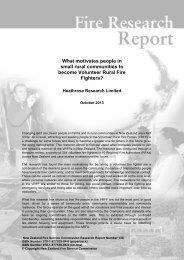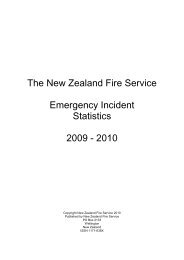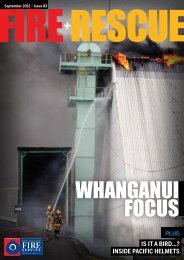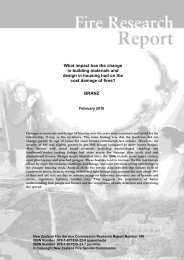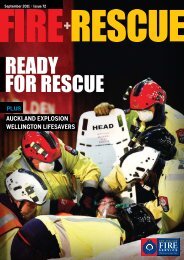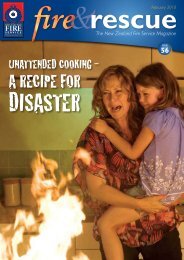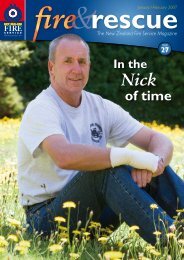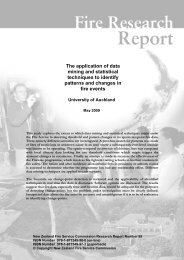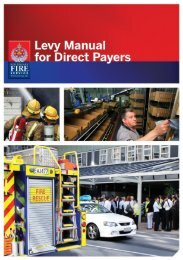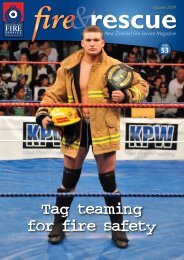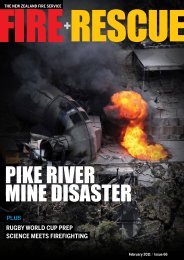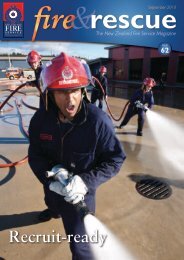Download - New Zealand Fire Service
Download - New Zealand Fire Service
Download - New Zealand Fire Service
Create successful ePaper yourself
Turn your PDF publications into a flip-book with our unique Google optimized e-Paper software.
Burn to learn<br />
Uncovering the cause of a rural fire can<br />
lead to initiatives that reduce the number<br />
of wildfires.<br />
So, investigating a rural fire takes its own set of<br />
specialist skills.<br />
A course for new wildlife investigators was held recently<br />
in Christchurch and Manager Rural <strong>Fire</strong> Christchurch,<br />
John Barnes, says it was developed for <strong>New</strong> <strong>Zealand</strong><br />
in cooperation with the United States, Canada, and<br />
Australia wildfire agencies.<br />
“Vegetation fires can often cover a wide area making it<br />
very difficult to find indicators of the path of travel and<br />
the cause. On our courses we set fires in various types of<br />
vegetation to build up our skills. For instance we learn to<br />
read the signs that show which way the fire travelled,<br />
which helps bring us to the area of origin. Witnesses are<br />
obviously also very important to our investigations.”<br />
He says one of the most successful initiatives led to a<br />
remarkable reduction in the hundreds of fires that used<br />
to start alongside railway lines.<br />
The <strong>New</strong> <strong>Zealand</strong> <strong>Fire</strong> <strong>Service</strong> Magazine<br />
<strong>Fire</strong> Insight<br />
“We worked very closely with railway staff and rural<br />
fire authorities to bring in guidelines to cut down on<br />
fires caused by railway operations, i.e. sparks from the<br />
exhaust stack and brakes, mechanical breakdown,<br />
track repairs, and other train operations.”<br />
Marae safety taken seriously<br />
All Te Wha - nau a Apanui iwi marae on the East Coast<br />
have now been surveyed as part of the marae fire safety<br />
programme thanks to the Waihau Bay volunteers.<br />
The iwi has 13 marae from Cape Runaway to Hawai<br />
Bay. It’s the first time an iwi has had all its marae<br />
surveyed and a certificate was recently presented<br />
to the brigade by National Advisor Ma - ori,<br />
Piki Thomas, to recognise their effort.<br />
<strong>Fire</strong> in gorse has its own<br />
peculiarities and those<br />
on a recent wildfire<br />
investigation course in<br />
Christchurch learned<br />
what to look for when<br />
trying to find the cause.<br />
Ma - ori Liaison for the Bay Waikato & Eastern, Lana<br />
Ngawhika, says this engagement would not have been<br />
possible without the Waihau Bay volunteers’ iwi<br />
connections. With their help, marae doors were opened to<br />
Lana. “Together we carried out the surveys and as a result<br />
of our reports some marae are now getting quotes<br />
for hard-wired smoke detectors and sprinklers.”<br />
The visit to Wairuru marae at Raukokore near Waihau Bay.<br />
From left to right: Stuart Robertson (Waihau Bay brigade),<br />
kauma - tua Mac Eruera, Tony Walker (Waihau Bay<br />
brigade), Bill Green (Chief <strong>Fire</strong> Officer of<br />
Waihau Bay brigade).<br />
July 2010<br />
9



